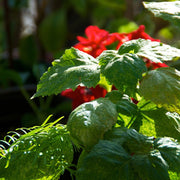How to use lemongrass essential oil (and a big caution)
Lemongrass essential oil is one of our favorites for reducing unwanted microscopic “visitors” drawn to moist areas. These unwelcome guests like to 'make themselves at home'. . . and can make things unpleasant for us. So we like to use lemongrass essential oil to keep these areas healthy—like damp shower stalls. Lemongrass tub and tile cleaners are wonderfully effective!
And what about closed leather shoes? A lemongrass essential oil foot cream can help keep the skin on your feet feeling healthy and itch-free. Lemongrass essential oil is also good for clearing away potential allergens, purifying the air, and staying healthy during cold and flu season.
It’s good at all this because it’s rich in the natural components 'neral' and 'geranial'. Together these two components are known as 'citral'. Citral is in the chemical family of 'aldehydes', and it’s a great cleaner! Most lemongrass essential oil is chock full of it.
But take caution with most lemongrass essential oil: Lemongrass essential oil that is rich in CITRAL can irritate skin!
When we see an essential oil rich in aldehydes, we can make an educated guess that the oil might cause skin irritation, and we want to limit its use in topical applications (or nasal inhalers).
So it’s a good idea to limit the amount of lemongrass in your body products. Stick with a safe dilution ratio of 1% (5 or 6 drops of essential oils for every 1 oz of carrier), and include skin-nourishing essential oils such as Lavender (Lavandula angustifolia) or Patchouli (Pogostemon cablin).
Unless . . .
You have a unique variety of lemongrass that nourishes skin!
Lemongrass essential oil that nourishes skin? That's rare and exciting! Can you imagine how excited we were when we found a lemongrass variety that doesn’t irritate skin?
We had to meet the farmer and distiller! His name is Gurpreet, he lives in India, and he grows and distills a variety of lemongrass rich in the component 'rhodinol'. Rhodinol is not an aldehyde. It’s in the chemical family of 'monoterpenols'. When we see an oil rich in monoterpenols, our educated guess is that it’ll be gentle on skin. And Gurpreet’s rhodinol-rich lemongrass lives up to expectations!
Rhodinol-rich lemongrass essential oil is gentle on skin!
This rare variety of lemongrass (Cymbopogon citratus ct. rhodinol) is every bit as effective when it comes to keeping surfaces clean and reducing microbes, but thanks to the high rhodinol content, we can use it more for skin care applications, too.
(Cue the aromatherapy celebration!)
How you can use rhodinol-rich lemongrass essential oil
Most lemongrass essential oil smells herbaceous and penetrating, even "sharp".
Rhodinol-rich lemongrass essential oil has a soft, rosy scent with hints of citrus. It’s so soothing!
We love this soft, gentle, exceptional variety of lemongrass essential oil for:
- Reducing the presence of germs and other unwanted microscopic 'visitors'
- Clearing potential allergens away from linens & upholstery (make a linen spray!)
- Keeping the bathroom clean (even moist areas, like the shower stall)
- Relaxing in the evening
- Calming feelings of stress throughout the day
- Emotional balance
- Soothing physical discomfort around areas of minor injury
- Freshening the air (especially if something’s “going around” the house or office)
- Staying healthy when others start sniffling and sneezing
- Cooling down in hot weather
- Making a cooling, skin-supportive foot cream (great for itchy toes!)
- Cleaning your feet after you’ve used the shower at the gym
Rhodinol-rich lemongrass essential oil is great for natural cleaners, room sprays, diffuser blends, foot cream, linen sprays, roll-on blends, and inhalers. Get some recipes here!
Gurpreet is a very conscientious farmer, dedicated to 100% sustainable, organic practices. He cultivates his plants with love and care . . . and doesn’t try to force nature to yield anything it’s not ready to give. That means we’re on nature’s time-table with this rare essential oil. Read all about Gurpreet's story here.










